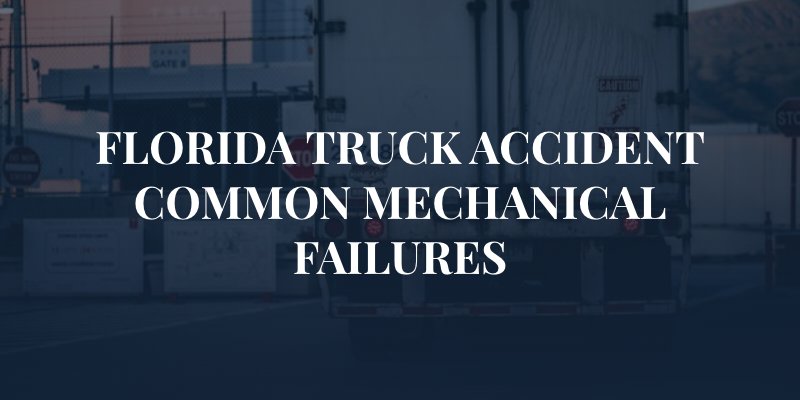
Small, lightweight passenger vehicles share Florida’s roadways with hundreds of thousands of large commercial trucks weighing up to 18,000 pounds when fully loaded. Although we rely on commercial trucks to supply the goods and services we need, Florida doesn’t overlook the significant danger large commercial trucks pose to smaller vehicles on the road. Most injuries and fatalities in commercial truck accidents occur to the motorists in other vehicles, not the truck drivers.
Truck accidents in Florida and elsewhere occur for many reasons, including distracted or drowsy drivers and inclement weather conditions that no one can control. However, a surprising number of commercial truck accidents happen each year in Florida and elsewhere because of preventable mechanical failures. When a truck’s mechanical systems, trailer, tires, or other equipment aren’t in top-working order due to poor vehicle maintenance, faulty repairs, or defective products, the results can devastate other motorists sharing the roadways.
Driver error remains the most common cause of all traffic accidents, including commercial truck accidents in Florida, however, mechanical failures in large trucks with complex systems pose a significant safety threat on the road. In a single large University of Michigan study on truck accident causation sponsored by the U.S. Department of Transportation, an astonishing 55 percent of trucks had mechanical violations discovered after a crash. The following common mechanical failures are noted in a significant number of truck accidents.
Brake failures in large commercial trucks are the most common mechanical failures known to cause accidents. A typical loaded 18-wheeler requires the length of two football fields to come to a full stop when traveling 55 miles per hour. When the brakes on a commercial truck are not in top working order or the brake system fails, the result can be a catastrophic accident such as a rear-end accident or a jackknife accident involving one or more other vehicles. Worn-out brakes, brake fluid leaks, and torn vacuum hoses all contribute to brake failures in large trucks.
Shreds of worn truck tires litter Florida’s roadways and many Florida car drivers witness truck tire blowouts when sharing the road with a commercial truck. Truck tires take tremendous wear and tear and should be in acceptable condition before a truck enters a roadway. Old tires, tires with worn or uneven tread, and mismatched tires, all contribute to truck tire blowouts. When a truck has a blowout, the driver may lose control of their 18,000-pound vehicle. Flying tire shrapnel and tire pieces on the road also cause accidents to occur when motorists hit them or swerve to avoid them.
Trucks are large and unwieldy, requiring wide turns and difficult steering maneuvers. It takes an alert, experienced driver to maneuver a truck properly and a fully functioning steering system A truck’s steering system includes mechanical and electrical parts that must function smoothly and flawlessly at the driver’s turn of the steering wheel. Poorly maintained or defective steering system parts such as drag links, cross tubes, or steering shafts may result in poor steering maneuverability or a failed steering system.
Transmission failures in a large truck make the truck difficult to handle, sometimes allowing sudden speed deceleration that can result in an accident on busy highways. Problems with a truck’s clutch, pump, joints, or valves sometimes result in transmission failures, making a truck a danger on the highway.
Failed trailer coupling results in serious traffic accidents. Truckers must ensure the trailer coupling is secure and electrical lines are connected so the trailer’s lights are operating and the trailer cannot detach from the cab.
Commercial truck trailers are large and dark at night, requiring reflectors and lights to be seen clearly by other traffic. Accidents sometimes occur when a truck trailer is in an intersection and lacks working lights or adequate, clean reflectors. When a motorist cannot see a truck’s trailer they may proceed into the intersection and collide with the trailer. Drivers also sometimes make lane changes into the path of a truck trailer due to dirty or missing trailer reflectors.
When an accident occurs due to a mechanical failure on a large commercial truck, there are several possibilities for liability in an accident claim. Although Florida is a no-fault insurance state that requires accident victims to file claims against their own insurance company, if an accident victim suffers severe injuries with long-term effects such as disability, they may file a claim against the party at fault—including in truck accidents. It often takes an investigation into a truck accident to determine the cause and the correct liable party. When a mechanical failure causes an accident, the liable party could be any of the following:
Truck accident attorneys in Florida are experienced investigators who document evidence of liability and then make a compelling case for compensation for injury victims.
When an injury victim suffers severe permanent injuries, they can file a claim to recover compensation for damages such as medical expenses, lost wages, and compensation for pain and suffering. For a Sarasota truck accident attorney or a Bradenton truck accident attorney at Shapiro | Delgado | Hoffmann to successfully prove a claim requires demonstrating the following legal points of liability:
Truck drivers and the companies they work for have a duty to ensure their truck is properly maintained and in good working order. When a mechanical failure causes a catastrophic accident the injury victim has a right to compensation.
All commercial truck drivers must perform routine inspections after ending a driving shift to ensure that the truck hasn’t sustained damage. Mechanical failures on commercial trucks must be repaired by authorized truck mechanics before returning to the road.